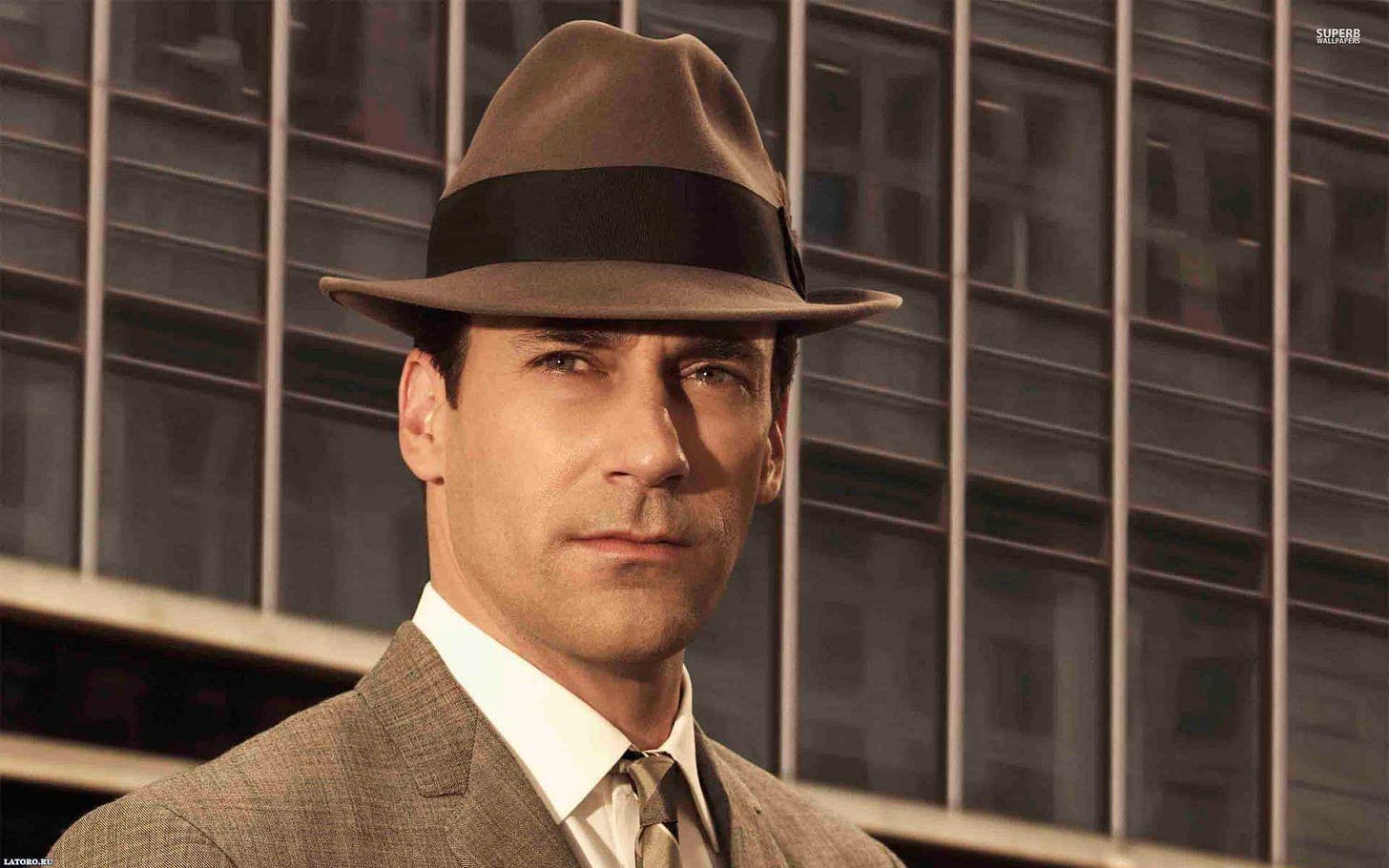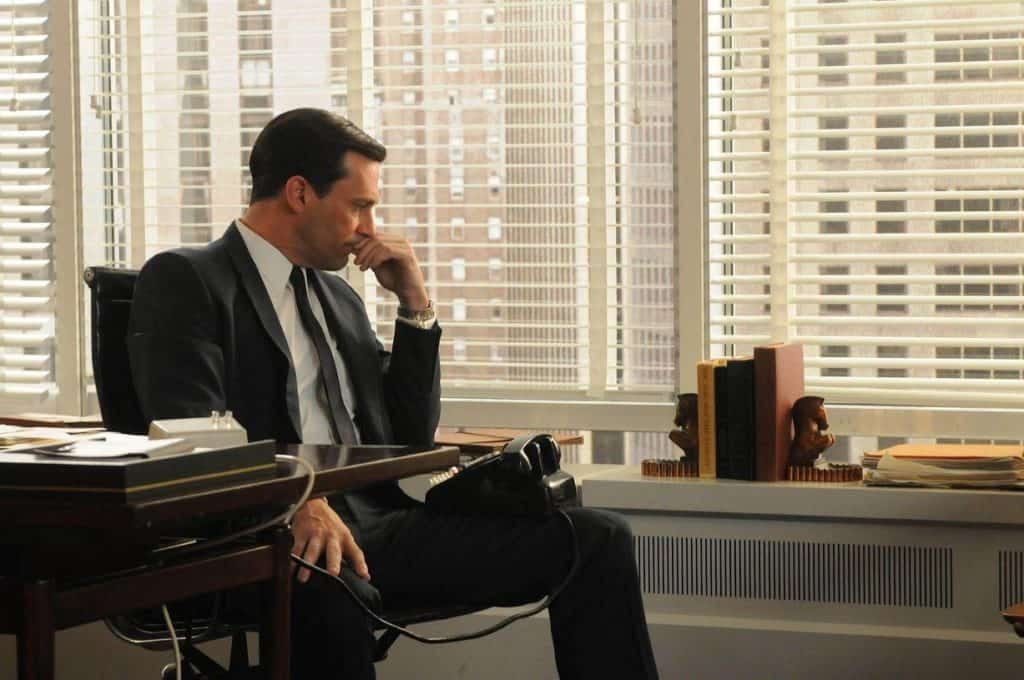The Genius of Mad Men: How Don Draper tells his own story to create meaning from nothing
The brilliant story of how one man uses storytelling to control everything and everyone - and what it means.
I’m a decade late, but I’m wrapping up my viewing of the sweeping, stylish drama that is Mad Men.
The very first thing we see is a definition. “Mad Men” was coined in the late 1950s to describe the advertising executives of Madison Avenue.
After a pause, it adds: “They coined it.”
And so kicks off a driving theme of Mad Men: the habit of its characters to tell their own story and convince others of its veracity.
The show, which debuted in 2007 and ran until 2015, centers on an advertising agency, Sterling Cooper, on Madison Avenue and its suave creative director, Don Draper. It captures the nostalgia of a smoky, bygone Manhattan. Key historical events like the assassinations of JFK and Martin Luther King Jr., civil rights protests, and the Vietnam war unfold around characters that don’t yet know they’re passing through history.
The story is told, too, in accordance with the customs of the time. Men take center stage, workplace misogyny is table stakes and, at all times, everyone has a cigarette in one hand and a drink in the other.
Series creator Matthew Weiner examines themes of varying depth, often done with an intellectual rigor uncommon to television, though the show centers most on the main character’s struggle to dictate and conjure his own narrative, even as plot points increasingly conspire to wrest control from him.
Warning: spoilers ahead.
Don Draper doesn't believe in fate🔮
Mad Men takes seven seasons to try and answer the question: Who is Don Draper? And Don himself tries his utmost to answer the question himself, with no shortage of lies and denial.
The first three seasons chipped away at the idyllic life Don had built, which resulted in the deconstruction of his carefully crafted, veiled identity.
Up to that point, viewers watch Don operate in a life that he’s pieced together just so. He’s put meaning where it wasn’t, and tells the story of his own life and others’ in a way that few question. Don has put his identity into an artificial persona. He did it so well that, at times, even he could not tell the two apart.
Another way to put it: Don’s in the business of being in control. He strives to control how others perceive him and, through advertising, how others think about what they want in life. He says in season six fate isn't something he believes in.
Even Don's role as an ad man gives him a keen instinct for giving people what they want, even if he’s the one who has to tell them what that is.
The show introduces Don as a creative genius, a man who has it all. He's both a suburban family man and city playboy. He has a flashy Madison Avenue job and passion for his work. He navigates the chauvinism of the office with an aplomb that others don’t exhibit and, at least in the early seasons, it makes him come off as a gentleman.
In the very first episode, we see Don flash a purple heart medal, reinforcing the guise he’s an upstanding figure.
Even in our initial glimpse into one of Don’s extramarital interests — a woman named Midge — it’s easy to garner some sympathy for Don, even surprise, because he goes to discuss ideas about one of his clients’ accounts. As viewers, we learn first why Don goes to see Midge before we learn that he’s doing it. The sex is an afterthought, a “so what” moment that minimizes responsibility. Don sees Midge as an outlet, someone that serves a purpose beyond being a mistress.
The noble attributes, of course, are largely a consequence of Don’s invention, and his will to be a perceived as a certain kind of man.
Rewriting the past📜
The show heavily leans into symbolism, and illustrates how meaning can be instilled into any arbitrary thing to change it entirely. In the pilot episode, a client tells Don over drinks that she isn’t married because she’s never been in love before.
As he typically does when facing matters of sentiment, Don shrugs it off and refocuses the conversation on something he constructs himself:
By love, you mean big lightning bolts to the heart, where you can't eat and you can't work, and you just run off and get married and make babies? The reason you haven't felt it is because it doesn't exist. What you call love was invented by guys like me, to sell nylons.
He decides the meaning of things, and it’s everyone else that’s responsible for fitting into his narrative.
Don in many ways exhibits the thinking of an existentialist — the lack of innate meaning in life is what gives you the freedom to choose. But he also, at times, lets that facade crack, and his view turns nihilistic, as it does in his nylons monologue:
You're born alone and you die alone and this world just drops a bunch of rules on top of you to make you forget those facts, but I never forget. I'm living like there's no tomorrow, 'cause there isn't one.
Don is great at constructing meaning, even when — especially when — there isn’t anything there. He invents a story, convinces others it’s the case, then comes to believe it himself. He tells people that something is what they’ve always wanted, even if it never really was.
We learn in the first season he chooses to adopt details of another man’s life into his own, even though those particulars were never his to begin with. Through the first three seasons, he runs from the person he was before serving in Korea, Dick Whitman. The original Don Draper was a fallen soldier who's identity got mixed up with Dick's.
His life is built on a lie, but he told it well enough and long enough to embody the deception as truth.
Authoring the future✍️
In what becomes one of the most iconic Don Draper moments, his pitch to Kodak in the season one finale — when he rechristens the photo projector from The Wheel to The Carousel — illustrates his ability to layer his own narrative over events that have come and gone.
Don says his old boss told him that, in Greek, "'nostalgia literally means 'the pain from an old wound.' It's a twinge in your heart far more powerful than memory alone."
This isn't a spaceship, it's a time machine. It goes backwards and forwards. It takes us to a place where we ache to go again.
Don shuffles through photos of him and his family that look happy and wholesome. Yet he had just told his family beforehand he didn't want to spend Thanksgiving weekend with them.
By this point in the show, we as viewers have seen Don's infidelity, dismissiveness, and even negligence of his family. But the photos that Don chooses to show spin a different tale.
There's multiple layers at play with the Carousel. Scores of photos sit in the machine, waiting to be projected onto the screen. When one appears, the others do not evaporate, they just await their moment to emerge once more.
On the surface, Don's using his skill as a storyteller to pitch a campaign to a client and gain more business.
But Don falls victim to his own presentation. He gets emotional, as if the pitch is as much for the client as it is to convince himself everything at home is okay. That his marriage in the moment resembles what the old pictures show — a time before his affairs and domestic complacency.
He convinces himself, if only for a moment, the past is still within reach.
It lets us travel the way a child travels. Around and around and back home again. A place where we know that you're loved.
There's photos of Don and Betty at their wedding. There's a nap with his children. A family day at the park. A smiling new year's kiss between husband and wife.
Don's eyes glisten as he feels the impact of his own pitch. He's controlling how his life appears, and he likes what he sees. His family's glee exist in that moment, in that conference room, because Don puts it there himself.
Storytelling as a control mechanism📺
In season four, Don's ad agency abruptly loses Lucky Strike. The client at that point accounted for the majority of the firm’s business. The loss weighs heavy on company morale.
Naturally, Don publishes a letter in The New York Times to take control of the narrative. He says he's "relieved."
For over 25 years we devoted ourselves to peddling a product for which good work is irrelevant, because people can’t stop themselves from buying it. A product that never improves, that causes illness, and makes people unhappy. But there was money in it. A lot of money. In fact, our entire business depended on it. We knew it wasn’t good for us, but we couldn’t stop.
And then, when Lucky Strike moved their business elsewhere, I realized, here was my chance to be someone who could sleep at night, because I know what I’m selling doesn’t kill my customers.
Don’s still a chainsmoker after the letter, but publicly he paints a picture of a man living on moral high ground. He injects his own meaning into something he had no say in, and would have chosen the opposite outcome had it been his choice.
Don's reaction to the unspooling of his identity is simply to move forward. There’s no other choice, in Don’s view, other than carrying on without dwelling. That tactic also gives him the best shot at authoring the narrative to come. It lets him bury the past with something of his own contrivance.
Don sees something as fundamental as identity as something that can be apprehended to fit into whatever narrative he chooses. It means, to Don, it isn't wrong for lies to become someone's truths and guideposts.
Through the first half of the series, Don acts as if he's always the right person to fulfill the needs of others, live the life he desires, and determine how events are perceived — so long as he can tell the right story.
Complement this with a readings on how a top designer brings his art to life, the power of choice in doing great creative work, and methods to develop your own sense of meaning in work.



